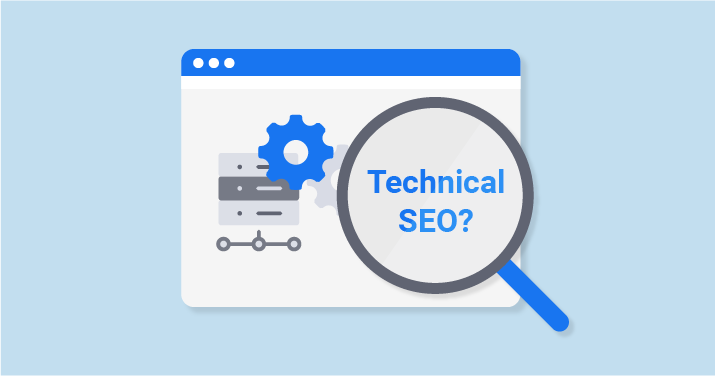Everyone in the SEO industry is constantly looking for ways to improve their website and search engine rankings. You’ve probably already tried on page and off page SEO, but have you ever tried technical SEO?.
The Importance of Technical SEO

If you haven’t, then you’re missing out.
Although on page and off page are the most common areas of SEO, there are in fact other areas.
Technical SEO is one of those other areas and also plays an important on your website and its rankings. Often swept under the rug, technical SEO if often seen as “too hard” or “complicated” by many SEO beginners. However, when you understand what it’s all about, it’s really not that hard to grasp.
Here’s everything you need to know about technical SEO and why it’s important for your website.
What is Technical SEO?
If you’ve been in the SEO industry for any amount of time, then you probably have experience with on page and off page SEO. Both of these relate to SEO work that is either done on your website such as content and optimisation, or off your site such as backlinks. So what exactly is technical SEO and what does in involve?
Technical SEO refers to SEO work on your website that is not related to content or off page SEO. With technical SEO, you are trying to improve how search engine spiders crawl your website in order to get better rankings. One example of this would be page load speed. If you didn’t know already, Google factors page load speeds into its ranking factors.
If your website takes 10 seconds to load, then it’s going to harm your rankings. You might have a really well-optimised page but with a load speed that slow, you’ll most likely never make it to page 1. This is where technical SEO comes in.
As you’ll discover later on, technical SEO is all about fixing errors on your website and helping robots that crawl your website. After all, what’s the point in having amazing content if search engines can never find it?
Why Technical SEO is Important
Technical SEO is important for a number of reasons. First of all, it plays a major role in helping to improve your search engine rankings. People do on page and off page SEO to try and boost their rankings, and technical SEO is no different.
Unlike other forms of SEO however, technical SEO can be a lot more complicated and well, technical. In order to do technical SEO, you need to understand how search engines crawl your website and what they are looking for when they are crawling.
Another reason why technical SEO is important is that it also helps keep your website up to date by spotting any errors or broken pages. A website with broken and out of date links not only looks bad to search engines, but it also harms your user experience. A user visits your website to read content and hopefully convert. If your website is full of broken links, then it doesn’t exactly give off a good impression.
How to do Technical SEO on Your Website
If you want to try doing some technical SEO on your website then luckily it’s not as hard as it sounds. If you’re using WordPress for your website then there are plenty of free plugins which can help give your site a boost. Here are some technical SEO tips you can try on your website straight away.
Speed Up Your Site
Like we mentioned before, Google loves fast websites. Not only does a fast website help improve your rankings but it also helps improve user experience and conversions. According to a study by Kiss Metrics, 47% of consumers expect a website to load within at least 2 seconds. While 40% of users abandon a website if it takes longer than 3 seconds. As you can see, speed plays a major role in many areas on your site.
To help speed up your website, there are a number of quick changes you can do. One of the biggest contributors to a slow page load speed is the number of images you have on a page. Depending on the size and quantity of pictures on a particular page, you can quickly get a slow page load time. To help speed up your website it’s best to optimise your images. Did you know that you can reduce the size of your images without affecting the quality at all? These reductions can be as much as up to 60% which is very significant.
To optimise your images on your website there are two main ways. The first is to install a plugin such as Smush Image Compression that will automatically compress your images. This is great for beginners as it pretty much does everything for you. The second method is to manually optimise and compress your images using tools such as Photoshop. This is a bit more time-consuming and advanced, but will leave you with better results.
Another quick trick that can help significantly reduce your page load time is enabling Gzip compression. If you’ve used programs such as WinZip and 7Zip in the past, then you should know all about the benefits of compressing things. The same applies to websites. By enabling compression, you can reduce the size of your website and therefore the time it takes to download it.
Crawl Your Website For Broken Links
Another quick technical SEO tip is to check your website for broken links regularly. Broken links make your website look bad and can have lots of negative effects on your website. Maybe you’ve recently changed the URL or slug of a post in WordPress. Well bad news, if that page was ranking in Google then it will suddenly become a 404 page. All other links linking to that page will also become 404 pages. Not only does this mean Google will have trouble crawling your website, but users will be left disappointed when they can’t find the resource anymore.
To scan for broken links on your website you can use tools such as Screaming Frog and Ahrefs. Simply enter your website’s URL and they will scan your website searching for broken outgoing and internal links. Once you’ve found some broken links you have 2 options. Either redirect the page to a new page, or change it back to the old URL address.
Luckily, there are some fantastic WordPress plugins that will save you lots of headaches and help you redirect pages to their new URLs. Be sure to check out the following plugins:
If you happen to find a broken URL that is going to an external page that is not on your website, then be sure to change them too. Unfortunately, you don’t have control over what other websites do with their web pages but you can always switch them to a new URL.
Increase Internal Linking
When it comes to search engine spiders and crawlers, links are crucial. Not only do they help with SEO but they also help users navigate your website. Thanks to Google’s “user experience factors” there are now several factors which play an important part on rankings. These include things such as the average user’s time spent on the page and their bounce rate.
By increasing the amount of internal links on your website it helps improve rankings as well as make your website easier to crawl. If one of your website’s pages has a lot of quality backlinks going to it then you can benefit other pages on your website by linking to them. Having more internal links on a page helps increases the amount of link juice passed to other web pages.
Passing this link juice helps your other web pages rank in Google with very little effort. In addition to this, it increases the time users are likely to spend on your website as well as reducing the page’s bounce rate.
Since Google counts a 1-page visit as a bounce, by getting users to click on other pages on your website, it helps reduce your bounce rate.







Leave a Comment
You must be logged in to post a comment.